Everyone wants to look fantastic on their wedding day.
No matter how you feel about wanting to look skinny, losing weight is something most brides go through before they tie the knot. Some people want to lose five pounds to look trim, while others attempt to go through significant weight loss to look their best.
When should you buy a wedding dress if you’re losing weight?
Brides should usually buy their wedding dress anywhere from eight months to a year before the wedding. This guarantees you’ll get the type of dress you want without issue.
However, losing over fifteen pounds can complicate the process because the dress will likely require alterations to fit properly on your wedding day. Therefore, you’re often better off waiting to buy the dress until you’re closer to your target weight.

If you are losing a lot of weight before your wedding, you should stay in close contact with the boutique or a good tailor to make any necessary adjustments in advance. Then, if you’re in sync with your team, you can adjust just days ahead of the wedding when you must.
However, you should know that certain types and styles of dresses can only be altered so much before changes affect how they look. Sometimes, you’d have been better off waiting to buy a different size.
Here’s some helpful advice on when to buy your wedding dress if you’re losing weight and what you can do to ensure you look great and your dress fits correctly.
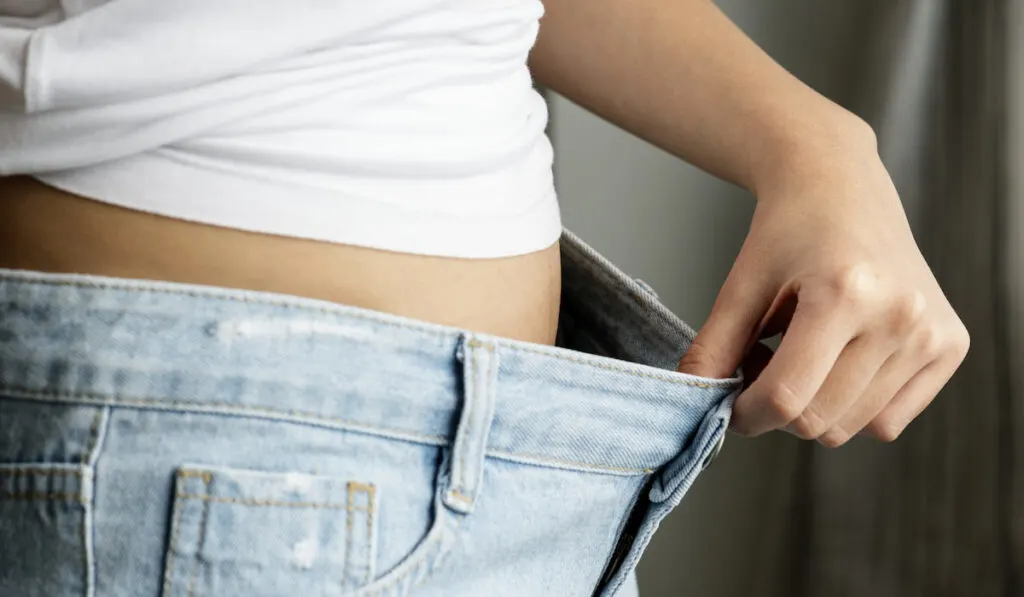
Table of Contents
How Much Weight Are You Losing?
Most wedding dresses can be altered to go down to around two sizes.
Going down two sizes is usually OK for people losing anywhere from five to fifteen pounds. Anything more than that, however, and you should probably hold off on purchasing a dress.
Once you get within fifteen pounds of your goal weight, you can start the buying process.
Whether you’re losing 80 pounds or 30, don’t buy the dress until you get into a range where alterations won’t drastically change how the dress looks.
This, of course, can be challenging depending on what type of dress you want and where you are. The timing of your wedding also matters.
If, for example, you’re getting married in the summer, you’re going to have a harder time finding the right dress as you get closer to your wedding date.
If your weight loss gets into a more normal size range, you’ll also be competing with more brides-to-be. This makes getting the perfect dress challenging.
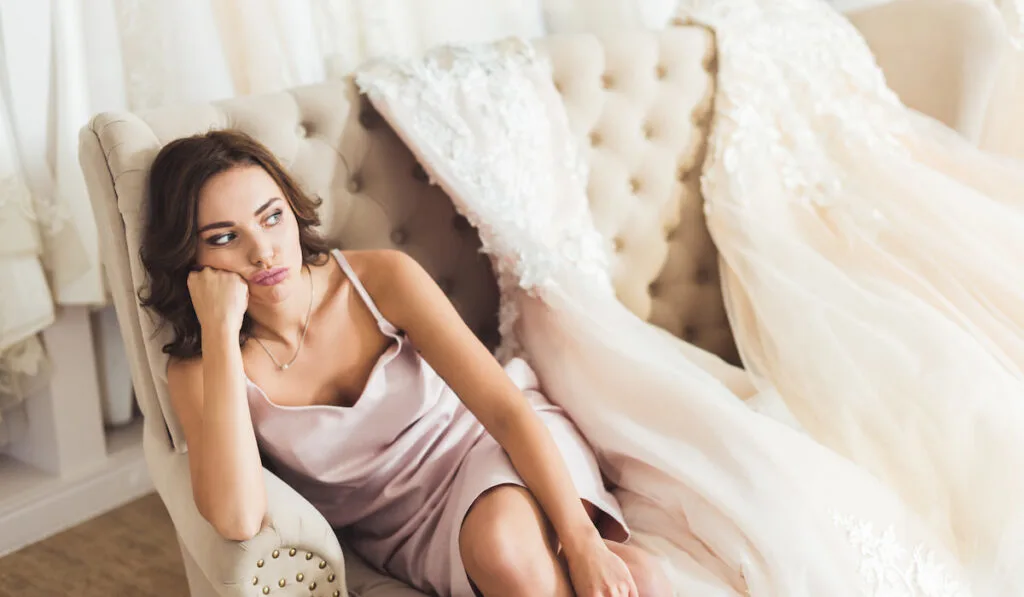
You May Not Love the Same Dress Styles
Significant weight loss can transform the way people look. Yes, you’ll look skinnier, but it will also affect your face, the way you walk, and other parts of your body.
Weight loss also usually boosts your self-confidence. For example, you may feel perfectly comfortable wearing a sleeveless dress or something with a plunging neckline now that you feel better about your body.
If you buy something conservative to cover areas of your body that you were previously self-conscious about, you may regret not going for something different after a successful diet.
Just know that you may prefer different dress styles once you’ve shed over 20 or 30 pounds. Waiting will increase the chances that you’ll wear something you love as you walk down the aisle.
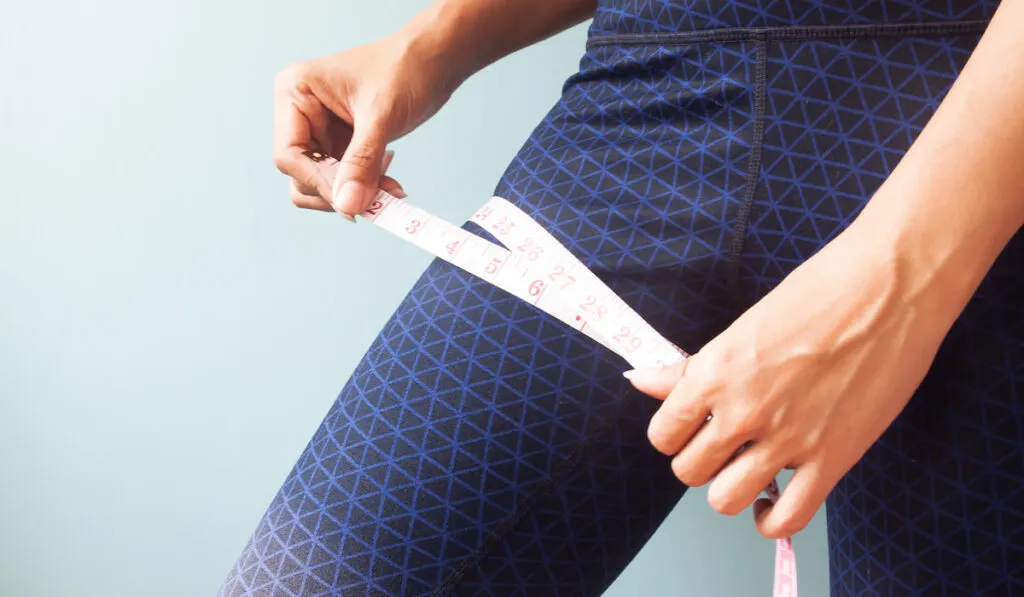
Losing Weight in Certain Areas
Losing weight for women can be particularly challenging because certain body parts seem to hang on to fat stubbornly. You start to see smaller hips, waist, thighs, or arms after you lose a good deal of weight.
You can never know exactly how the weight will come off, which makes buying a dress months in advance based on how you think you’ll look never a good idea.
Brides often, for example, buy a sleeveless dress with plans on having skinny arms and visible collar bones. When their diets fail to go according to plan, however, they end up hating the way they look in their dress.
Leave yourself more room for how your body will change and wait to buy the dress until you see results in the mirror.
Custom Dress vs. Off the Rack
How much weight you’re losing will also influence whether buying something standard at a boutique or online is better or if you can still get a custom designer dress made for the ceremony.
Here’s some advice to help you choose which way to go.
Custom Wedding Dresses
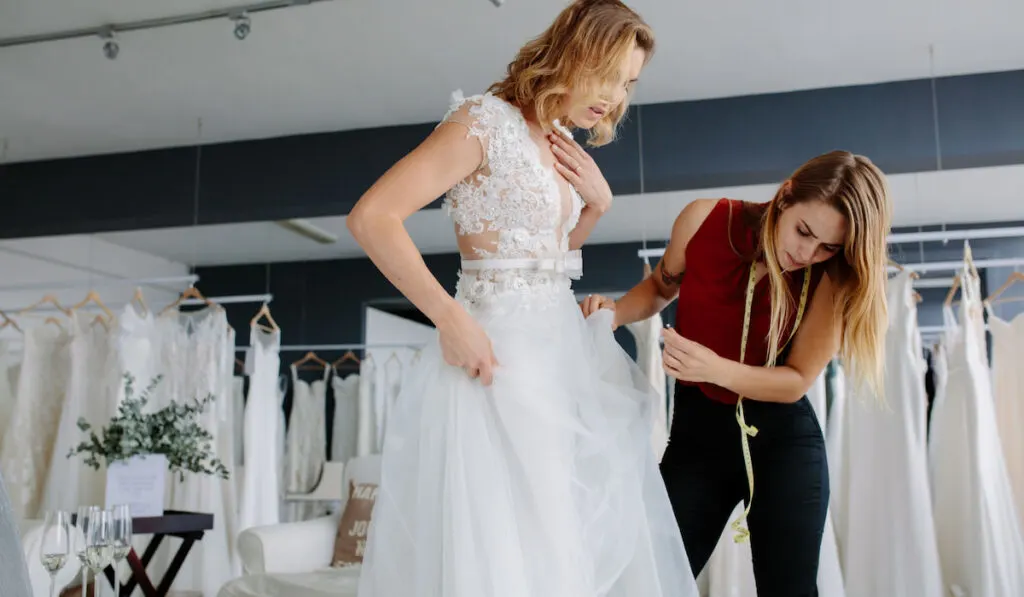
Custom dresses look amazing, but they’re harder to manage when undergoing significant weight loss.
For example, if you’re losing more than 30 pounds, you will have a challenging time getting a custom dress. Essentially, the dressmaker will have to keep remaking the dress as you drop sizes.
In addition, any crystals, lace patterns, and other dress accents can only be changed so much. It would be a shame to pay a premium for a unique custom dress and ruin it with too many alterations as you lose weight.
If you’re losing less than 15 pounds, buy your dress and let the boutique or your tailor know that you’re planning to lose weight before the wedding day.
Chances are they’ve dealt with this situation a million times, and they’ll leave enough room in the dress to make changes before your wedding without damaging the design.
Most brides buy dresses and plan on losing a few pounds, so it’s something most good boutiques build into their plans.
Buying Off the Rack
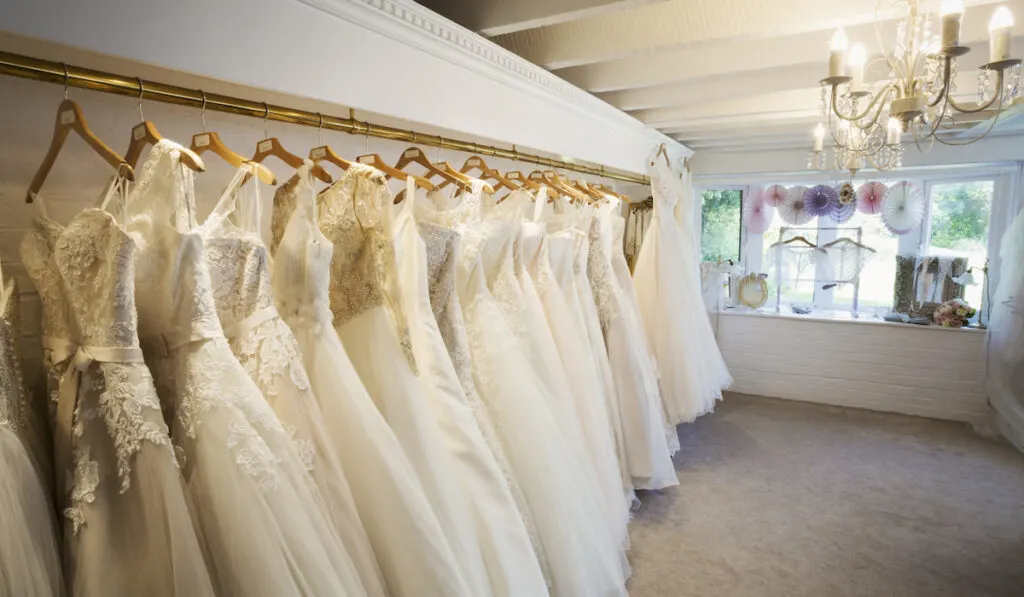
Buying off-the-rack dresses can be frustrating for people who have specific visions of what their dress will look like. When you buy something at a store, you typically get less accommodation.
Alterations are either made in-house, or the dress is shipped to an off-site tailor after measurements are taken in the store. As a result, the experience is much less personable.
What buying off the rack does accomplish, however, is saving you money and avoiding the stress of having a dress that’s too big for you. You can manage tighter timelines and stay committed to your weight loss journey.
When you’re on a roll with your diet, it’s often hard to stop because you want to fit in a dress in a certain way. For overweight people, losing weight feels terrific, and having to buy a new dress is a small price to pay for feeling great about your body.
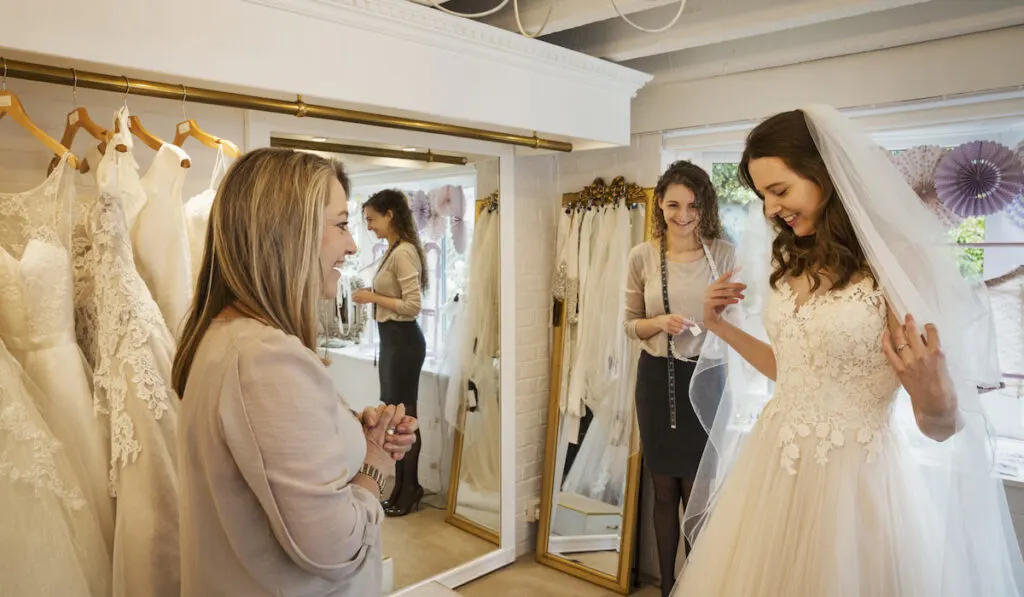
Certain Styles Are Easier to Alter
The type of wedding dress you buy could make it easier to alter.
For instance, sleeveless dresses are much simpler to take in compared to a dress with lace sleeves. The same goes for dresses with spaghetti straps.
If you buy a dress with a wider skirt, like a ball gown, tailors can take them in faster without affecting how they look.
However, altering a dress that hugs the hips and thighs can be much more complicated because it changes the shape and any patterns on the fabric.
Dresses with lace, crystals, and beads are good for alterations because they hide the stitching better, but repositioning those small details takes a lot of time.
If you do need to alter an ornate dress, you’ll need to give tailors more time before the wedding day.
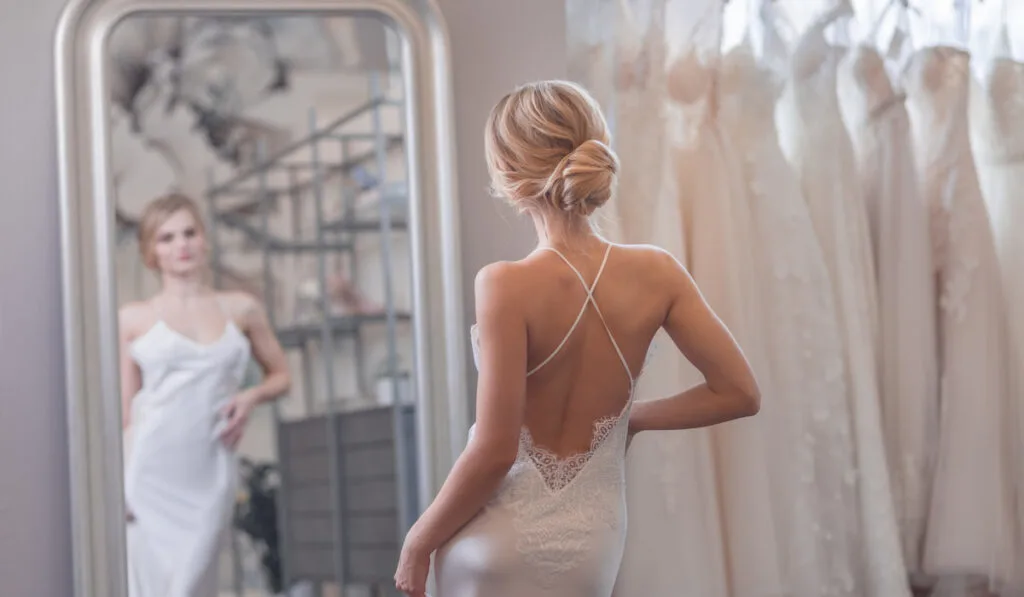
Avoid Buying an Aspirational Dress
Buying a dress in one size smaller is fine, but anything more than that can be a huge mistake. Every year, brides buy dresses that are too small for them based on the hope or goal that they’ll lose a lot of weight before their wedding day.
While it may work out for some, most brides simply buy other dresses closer to their wedding off the rack that fit them. So, they’re stuck with the first dress or have to sell it at a steep discount.
If you’re hoping to lose anything more than fifteen pounds before your wedding, skip the stress and hold off on buying until you know what will fit you.
Buying something you can’t get into now can lead to upset feelings and a last-minute scramble for a dress that fits.
It’s typically better to buy something that fits you now and alter it later than buy something you may not be able to wear.
More Alterations Will Cost More Money
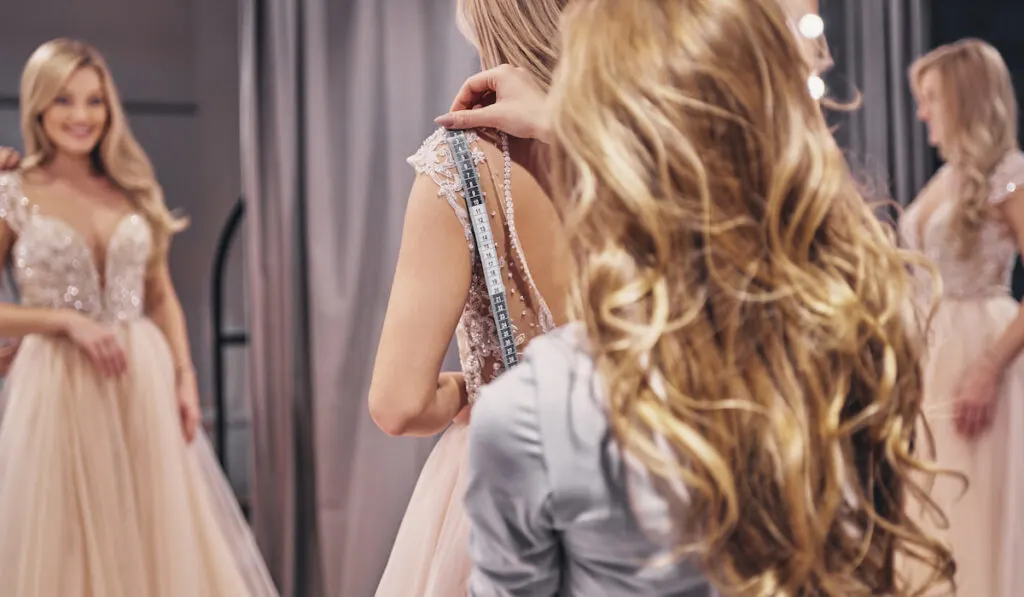
Alterations aren’t free.
Even if your dress can be altered down to more than two sizes, it will end up costing you more money. Additionally, your tailor or the boutique may not be able to squeeze you into their schedule.
You may also deal with issues like discontinued materials and lace patterns that are hard to find.
Spare yourself the trouble and either buy a dress that’s easy to take in (sleeveless, ballgown, etc.) or wait to buy the dress.

Avoid Losing Weight After Your Last Fitting
Your last dress fitting will usually happen a couple of weeks before your wedding day.
If you lose more weight, you’ll be tugging on your dress to put it back in place all day. Do your best to stop losing weight after the fitting.
No bride wants to worry about wardrobe malfunctions or gaps in her dress. So put the diet on hold between your last fitting and your wedding to guarantee your dress will still fit perfectly.
